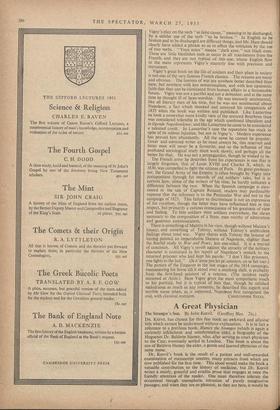A Great Physician
The Stranger's Son. By John Keevil. (Geoffrey Bles. 21s.) DR. KEEVIL has chosen for this fine book an awkward and allusive title which cannot be understood without explanation. It is in fact a reference to a previous book, Hamey the Stranger (which is again a curiously infelicitous and uninformative title), a biography of the Huguenot Dr. Baldwin Hamey, who, after serving as court physician to the Czar, eventually settled in London. This book is about the son of Baldwin Harney the elder, a gentle and learned physician of the same name.
Dr. Keevil's book is the result of a patient and well-rewarded examination of manuscript sources, many extracts from which are now published for the first time. This alone would make the book a valuable contribution to the history of medicine, but Dr. Keevil writes a manly, graceful and erudite prose that engages at once the friendly attention of the reader. One must therefore tolerate the occasional though unemphatic intrusion of purely imaginative passages; and when they are so pleasant, as they are here, it would be
churlish or pedantic to denounce them on general principles. Much of one's pleasure in reading this book is due to Dr. Keevil's easy and affluent way of dispensing historical detail from the well-ordered stores of his own knowledge.
Baldwin Hamey is a slightly hesitant and retiring character, fond of a punning Baroque style in his Latin letters, extremely kind, morally unimpeachable and of eminent skill in his profession. He was qualified to practise independently in London in 1630. One should Perhaps remember that a physician's work in the seventeenth century Was not so much a matter of learning as of establishing sympathy and confidence and avoiding errors; in therapy and in diagnosis both knowledge and practice were extremely limited; a mere stirring or "measuring" of urine was enough to justify a prescription or treat- ment. But Hamey was more than a mere practitioner; he was active, benevolent and influential in the affairs of the Royal College of Physicians, the presidency of which he refused, though he was elected Treasurer in 1664. During the Civil War, Hamey, like many other men, found it advisable to have "friends in both parties." After the Restoration he refused the post of Physician in Ordinary to the King and a knighthood. In some respects the most interesting part of Dr. Keevil's book is the chapter dealing with the activities of the Physicians in London at the time of the Great Plague—that is, the activities of those brave men who stood at their posts, for the greater number fled. Far too gentle for energetic malice, Hamey was not without a simple delight in fun; he induced the Royal Society to "take the Bait" of a "new apple roaster," a purely ironical invention.
After reading this book one is convinced that Baldwin Hamey Could not have been more fortunate in his biographer. He has been well understood by Dr. Keevil, who displays him quietly and affectionately, neither forcing the lights nor deepening the shadows, and always perceiving clearly the relation between the man and his times. The book is a perfect example of how such a biography ought to be written, and a lesson to writers of much greater repute but of much less competence. A great deal is to be learnt also from the gently dignified life of Hamey himself, a man unshaken by calamitous events and honourably dedicated to the noblest of all professions.
C. E. VULLIAMY.



















































 Previous page
Previous page